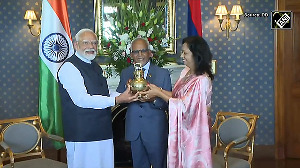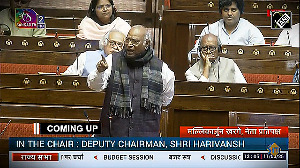I really would like to believe that the Americans are a positive force in the moves towards a settlement in Kashmir. As a general principle, Americans, rightly, look for an angle, and I hope their vested interest for the moment coincides with India's. For the purposes of this column, I shall be an optimist, and let's see if I run into terrible contradictions.
Let me state categorically that I have absolutely no faith in all this Indo-Pak parlaying leading to anything concrete. I laid out in some detail why I believed the last round of talks would fail in a previous column 'It is their nature, it is their custom: Why the Indo-Pak talks are doomed.' I argued then that it is impossible for Pakistanis to be anything other than warmongers. I still think the Moriori-Maori analogy is very applicable in the subcontinental situation. Nothing has changed. If the Pakistanis are left to their natural instincts, there will be no results this time either.
Nevertheless, there is a vanishingly small chance that something is different this time: and that is because of the general environment. Several things have happened, especially from America's perspective: September 11th, the Afghan War, Gulf War II, the ascendancy of the neo-conservatives, growing disillusionment with Saudi Arabia. In summary, despite the constant refrain that 'Pakistan is a valued ally in the war against terrorism,' American policy-makers do know it is a terrorist, rogue, failing state.
In comparison, India looks good as an economy. The Indian elephant is moving at long last. Not only in services, but also in manufacturing, India is finally making the strides she has long been capable of, but has failed to because of stifling Nehruvian Stalinist dogma. But as the clever Chinese figured out correctly some time ago, the strife imposed by their proxy Pakistan is reducing Indian GDP growth by 1 to 2% a year. Thus, India has a strong interest in settling the Kashmir issue if at all possible, and getting on with the task of making herself a developed nation in the next twenty years.
It is possible that Pakistan is also coming around to the realization that jihad isn't quite the panacea their imperialist Sunni Punjabi Army has been claiming it is. Their country has become an international pariah, and it was only the fortuitous circumstance of American obsession with Osama bin Laden that has given them a temporary reprieve: but Americans, with famously short attention spans, are already losing interest in Afghanistan.
In the period 1989 to 2003, while the Pakistani generated and sustained insurrection in Kashmir has hurt India economically and politically, it has affected Pakistan considerably more, as growth has stalled. India's economy is 7 to 8 eight times larger than Pakistan's, and GDP has been growing twice as fast: Indian per capita GDP numbers (both nominal and PPP) are now ahead of Pakistan's and pulling away quickly. And economics is destiny: the demographic bulge of unemployed youth that feeds the jihad machine exists because of a lack of opportunity combined with an increasingly illiterate and unskilled populace educated only in Universities of Terrorism.
Furthermore, the Pakistani economy has been sustained on life-support by handouts from the Americans and the Saudis. In an interesting situation worth watching, the Saudis are getting increasingly impoverished, especially because of their booming population and stagnant oil revenues. From a per capita income of $28,000 in the 1970s, Saudis have fallen to a per capita income of $8,000 in the 2000s: a dramatic reduction in prosperity. They literally cannot afford to be the moneybags behind Pakistani terrorism.
China will have to dole out more and more money to keep Pakistan afloat: and there, with the salutary experience of North Korea in mind, the Americans have a clear vested interest. Pakistan's antics as China's cats-paw are not endearing them even to their biggest cheerleader, General Colin Powell, the epitome of State Department Cold War bigotry against India. Americans can see that the Sino-Islamic axis is arrayed against them.
Americans would like to wean Pakistan away from the Chinese sphere of influence because of their interest in Central Asian hydrocarbons, which they want for themselves, and even more importantly, want to deny them to China. This is economic warfare, as it will act as a check on China's possible growth. Controlling the sea-lanes in the Indian Ocean, with India's help, falls into the same category.
After all, one might argue that the entire Afghanistan campaign was 'Unocal's War,' intended to build a pipeline from Central Asia through Afghanistan and Pakistan to the Arabian Sea where American tankers wait. This is much like the Spanish-American War was 'William Randolph Hearst's War.'
In this context, I read the alarming news that the Pakistan-India gas pipeline, which I thought was thankfully dead and buried, is being disinterred under the auspices of the Asian Development Bank. A pipeline through Pakistan is a bad idea for India. It will create a security vulnerability, as it can be held hostage by the Pakistani army or terrorists. It reminds me of the picturesque American phrase, 'to have someone by the short and curlies.' As the Malayalam proverb goes, it's like buying someone a stick to beat you with.
The transit fees India has to pay will go directly into the coffers of the Pakistani jihadi establishment. It would be foolish for India to pay the Pakistanis to create terror in India. But in the grand tradition of Nehruvian foolishness (eg Kashmir and Tibet), it would not surprise me if India's current gerontocrats go in for this too, suffused with the newly rolled-out spirit of 'Hindi-Paki Bhai-Bhai.'
The more reasonable option would be to build the Iran-India undersea pipeline, even though it may be significantly more expensive. American oil interests don't like this, and are making it difficult to do even the preliminary exploration. But India's ties with Iran make sense: even the Americans, with their talk of Iran as part of the 'axis of evil,' are aware that Iran is far less wicked than China, Pakistan or Saudi Arabia. As far as India is concerned, Iran is a key tactical ally whose interests overlap with India's certainly in Afghanistan, and also in containing Pakistan's Sunni terrorism exports.
But going back to areas where India and the US have a commonality of concerns, there are at least two: one, the Islamic nuke, and two, containing China.
It is well-known that Pakistan has publicized its nuclear weapon as the 'Islamic Bomb,' all the better to shake down wealthy Arabs with. I will not comment for the moment on the fact that the alleged Pakistani bomb is not indigenous, but a screwdriver job with Chinese components being assembled in Pakistan and then exploded with considerable fanfare. Similarly with their missiles, courtesy China via North Korea.
I don't think Pakistan has any compunctions about further proliferating both nukes and missiles to their friends in Muslim nations, or for that matter to non-State actors such as international terrorists. Therefore if some suitcase-sized nuke is smuggled into the US, say, in a container ship steaming into the port of New York, it is highly likely that it has its antecedents in Pakistan.
Thus, an irresponsible Pakistan, prone to proliferation (this is not theoretical: they have already proliferated their nukes to North Korea) is a nightmare for the rest of the world. Clearly India and the US (and perhaps Israel) are the countries most likely to be the victims of such an 'Islamic' bomb.
An intriguing possibility has been brought up by Narayanan Komerath on the indicjournalists forum. He suggests that Pakistani 'strategic assets,' meaning nuclear weapons, have been neutralized by the Americans. He bases this on circumstantial evidence: for example, the reduced rhetoric from Pakistan. According to him, there has been not one instance of nuclear saber-rattling by Musharraf or anyone else in the chain of command since June 2002.
That would explain, suggests Komerath, why the US didn't make a huge fuss about the North Korea-Pakistan proliferation nexus. Neither the ayatollahs of non-proliferation in the State Department, nor self-proclaimed experts such as Stephen Cohen, jumped up and down. I personally attributed this to American fecklessness, but Komerath suggests Americans are calm because Pakistan no longer has any nukes to proliferate!
If this is true, it would mean that General Musharraf has taken another of his famous 180 degree turns after having been read the riot act by the Americans. Maybe this is why Prime Minister Vajpayee made his mystifying offer of talks. I too have been startled by the sudden offer, because it seemed that India, as usual, was giving far too much away for nothing in return.
Despite the temptation to think so, I believe Vajpayee is not looking for a Nobel Peace Prize. Nor is he as vain as Jawaharlal Nehru as to want to 'go down in history' -- which Nehru has managed to do for entirely the wrong reasons (gullibility, arrogance, having the worst possible set of sycophantic advisers). I hope Vajpayee has a plan, although he is holding his cards close to his chest.
Obviously, Musharraf would be extremely loath to talk about the loss of his 'crown jewels:' for if this is true, he has been reduced to an impotent demagogue presiding over a failing state. Such a figure could only be loved by his mother, and the likes of the Kolkata Telegraph's Sarmila Bose who wrote a paean to Musharraf in the Pakistani Daily Times on May 27. Bose clearly longs for a Musharraf-type dictator in India: did someone say Marxist-Islamist axis? Marxists just love fascist dictators, don't they?
Both Marxists and Musharraf have shown that they believe in the trappings, but not the reality, of democracy. Musharraf conducts sham 'elections' in which some 20% of the population votes! In West Bengal, anybody can stand for local elections, so long as they are Marxists (like Henry Ford's Model T, which you could have in any color so long as it was black). All other candidates will be shot. So we have fulfilled one of Marx's predictions, about one-party rule, only 'proletariat' now means 'lumpenproletariat Marxist thugs.'
nother of Marx's axioms has also been fulfilled in West Bengal, that of the 'withering away of the State.' Go to Kolkata, you will see that the state (pun intended) has indeed withered. There is an overpowering miasma of defeat: I spent some time there, and it is hard to escape the impression that the average Bengali has had his spirit crushed. What was once the crown jewel of India -- the rich province of Bengal -- is now its basket case. Alas, I find the same smog of despondency in Thiruvananthapuram, too: unless it dumps the Marxists pronto, Kerala will soon need to go to Tamil Nadu with a begging bowl.
I refer Bose and other 'regressive fundamentalist' resident non-Indians to a remarkably sane perspective in the Pakistani Dawn of May 27 by F S Aijazuddin, who also believes that Vajpayee is doing things for good strategic reasons, not for personal vainglory as in Nehru's case. He calls Nehru 'the latest in a series of insecure imperialists demanding to be taken seriously by the outside world.' Touché!
Talking of imperialists brings me to China. Apart from the purblind spin-meisters at the State Department, most people can see that China needs to be contained. There are several plausible scenarios about China: one, that they will continue to grow at the faked 10% GDP growth levels they have been trumpeting, and become the world's leading economy by 2020.
Two, that the innate imperialistic tendencies of China and its lebensraum theories -- its conceit about being the master race included -- will cause it to escalate military adventurism, gobbling up other territories as they have Tibet. Especially vulnerable are hydrocarbon-rich areas such as Russian Siberia and islands in the South China Sea.
Three, that the inherent contradictions in China -- including the economic divide between the coast and the interior, the teetering banking system, the various colonized people like Tibetans and Uighurs ready to revolt, the 150 million unemployable peasants, and soon, the 30 million testosterone-crazed young men who will never find a wife -- will lead to civil war, with nuclear weapons in the fray. See my earlier column 'China: From Mismanagement to Collapse.'
All of these scenarios concern the Americans. It makes enormous sense for Americans to build a cordon sanitaire around China to ensure that its ills, much like the SARS virus, do not propagate outward. India will be a key player in any such contain-China coalition, along with Japan, Russia, Vietnam and Taiwan, all of whom are threatened by unbridled Chinese chauvinism and aggression.
So there are at least two good reasons for the US to be an honest broker wishing to ensure a lasting peace in Kashmir.
Unfortunately, there is a catch. There is a semi-good reason for the US to want to keep Kashmir on the boil. This has to do with diversionary tactics.
The alliance of Christian fundamentalists and neo-conservative Jews (exemplified by the PNAC or Project for a New American Century) that is running American foreign policy is very concerned about the survival of Israel. They were the architects of the Iraq war, and they worry about other countries that can damage Israel, eg Syria, Iran, Saudi Arabia.
They know Israel and the US are the biggest targets of Islamist hatred. However, they calculate that if Islamist terrorism can be directed elsewhere, that would make Israel and America safer. I said the following in my post-September 11 column, 'Pearl Harbor Redux' at that time when we had all become Americans in shared grief:
Americans have perhaps deliberately allowed the creation of 'front-line' states that took the brunt of the damage. For instance, there is a school of thought that the Americans were perfectly happy to let the Kashmir problem simmer along because it kept a lot of radical Muslims occupied in low-intensity conflict there, never mind the damage to India, so long as there was no damage to the American mainland
I would say this same thought-process extends to protecting Israel via diverting the Islamists towards Kashmir. After all, soft State India will merely complain about the murder of its citizens, and will never actually do anything to the terrorists.
But that is only tactically wise, and is strategically foolish. As I continued:
the Americans may still use the Kashmir issue to keep India pre-occupied. This would be foolish in the long run, for this is precisely what China wants. And the Sino-Islamic axis is likely to be the biggest threat to the West in years to come.
If the Americans can get away from a short-term perspective of protecting themselves and Israel at India's cost, and look at their long-term interests, it is fairly obvious that a prosperous India, with much goodwill for the US, is not a bad thing for America.
The $64,000 question is: will they look long-term? Given America's past record of seeking instant gratification, that is unlikely. Therefore, I have to conclude, regretfully, that the Americans are playing games with India over Kashmir. They see no reason to move away from the State Department's historic tilt towards Pakistan.






 © 2025
© 2025